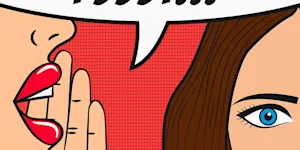What Makes This Word Tick
"Frisson" is a French import that slipped into English like a wisp of fog, bringing with it an exquisite shiver of excitement or fear. It describes a sudden surge of emotion, often thrilling and always noticeable, that tingles your spine and raises goosebumps. A frisson is fleeting, but in that brief moment, it's like a sneak peek into a more intense experience.
If Frisson Were a Person…
If frisson were a person, it would be that ever-so-enigmatic friend who always has tales that make your heart race. They’d show up unexpectedly, whispering ghost stories on a stormy night or taking you on an impromptu adventure. With an air of mystery and unpredictability, they offer a dash of excitement in a world that sometimes feels a little too predictable.
How This Word Has Changed Over Time
Frisson hasn’t shifted much in meaning since it was first borrowed from French. Its ability to capture that dainty dance of excitement beyond just fear or joy keeps it relevant. Over time, the word has traveled beyond literary circles to find a home in everyday conversations, adding a layer of sophistication wherever it lands.
Old Sayings and Proverbs That Use Frisson
While frisson isn’t central to any old proverbs as this delightful sensation didn’t quite make it into the teachings of yore, you might say it aligns with the idea that "variety is the spice of life." It’s the unexpected thrill that colors our daily routine, much like a sprinkle of pepper in a stew.
Surprising Facts About Frisson
Did you know that researchers have linked the sensation of frisson to the emotional high we get from music? Those goosebumps when your favorite song hits its peak are a classic frisson. It’s also pretty exclusive—a select group of people are more prone to experiencing frisson in response to art, music, or even dramatic films.
Out and About With This Word
The next time you're at a concert and feel that tingle during an epic solo, that's frisson in action. Or perhaps while watching a hauntingly beautiful sunset when atmosphere and aesthetics align. Frisson frolics around art museums, concert halls, and at any gathering where passion and beauty collide unexpectedly.
Pop Culture Moments Where Frisson Was Used
In Alfred Hitchcock's thrillers, frisson is practically a leading character. That spine-tingling suspense captures audiences each time Janet Leigh steps into the shower in "Psycho." Additionally, the reveal of Darth Vader as Luke’s father in "Star Wars" also delivers a collective frisson for the ages.
The Word in Literature
Frisson finds its home quite comfortably in gothic novels, horror stories, or any piece of literature that aims to spark an intense emotional response. Authors like Edgar Allan Poe, with his eerie tales, would have appreciated the concise punch that "frisson" offers—a perfect little chill for his audience.
Moments in History with Frisson
Imagine Marie Curie’s electrifying discovery of radium—a moment that would evoke frisson as the mysterious glow in the dark revealed its secrets. Decisive moments on the moon during Neil Armstrong’s first steps, when humanity watched breathless, could be aptly described as deserving of a universal frisson.
This Word Around the World
While English speakers borrowed "frisson" outright, in other languages, similar sensations are described differently. In Italian, one might say "brivido," or in Russian, "дрожь" (droz’). Each culture expresses that quicksilver thrill in its own colorful ways, yet the feeling remains universally understood.
Where Does It Come From?
"Frisson" sauntered in from French, originally meaning a "shiver, "stemming from the Latin "frigere," meaning to be cold, akin to the sensation of a sudden chill pervading one’s spine. It encapsulates the idea of thrills so intense, they almost feel like a physical shiver.
How People Misuse This Word
People sometimes use frisson when they mean simply a chill or a thrill, but true frisson is specific—a nuanced and yummy sensation tied to the arts and poignant personal experiences, rather than everyday excitement.
Words It’s Often Confused With
Thrill: More general and broad, lacking the nuanced emotional specificity.
Chill: Related to coldness, but missing the emotional component.
Shock: Conveys surprise with less emphasis on emotional or aesthetic enjoyment.
Additional Synonyms and Antonyms
Synonyms for frisson include quiver, shiver, and thrill. On the flip side, antonyms would be dullness or boredom, which describe the absence of that electrifying pulse.
Want to Try It Out in a Sentence?
“Listening to the crescendo of the symphony, a frisson swept over her, leaving her skin tingling with awe.”
















